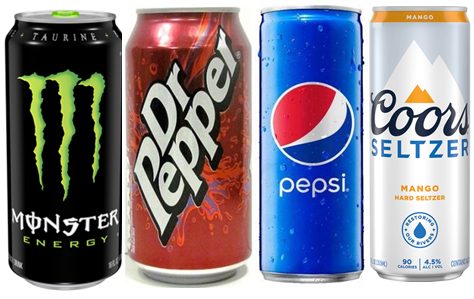

The global deficiency of aluminium supply in 2020 has worsened the position of the soft drink producers and brewers, who hugely count on aluminium for packaging i.e. aluminium cans. Following Q1 2021, multiple CEOs have raised the impact of rising cost in production due to the insufficiency of aluminium supply.

Rodney Sacks, CEO of Monster Beverage Corp lamented that his company was compelled to source aluminium cans from South America and Asia due to supply constraint in the domestic aluminium can industry. He even explained that the cost of cans was not so on the higher side, but relatively the up-rise in freight and logistics spending is the major cause.
Sacks stated: "We've always tried to manufacture and sell within regions to avoid excessive shipping costs. We had to break that this year to satisfy consumer demand."
Bob Gamgort, CEO of Keurig Dr Pepper (KDP) also commented while keeping shipping costs in mind following the Q1 2021 results: “Aluminium prices continue to rise and that KDP has experienced a spike in transportation and logistics costs.”
Supporting Sacks' and Gamgort's grievances of the rise in the price of aluminium at a record high, the other reason which has come to the factor is the trade dispute between China and Australia, which has convulsed the global aluminium market, as China is the world's leading buyer of the aluminium metal while Australia is a major producer of raw materials for aluminium production i.e. bauxite and alumina. However, in the beverages segment, it was observed the shift to grocery sales during the Covid-19 pandemic has raised the demand for certain formats.
In October’20, Gavin Hattersley, CEO of Molson Coors Beverage Co said: “A lack of slimline 12oz cans for hard seltzers had forced his company to suspend some slow-moving lines.”
The globally marketed beverages brands are somewhat in short term safeguarded from price oscillation by hedging, as they lock in prices for months or years ahead. Even so, the vital trouble, for now, is the augmented transportation costs as the shortages driving beverage companies to source from a further destination.
“Transportation costs cannot be hedged”, as KDP's Gamgort highlighted.
Although, sooner or later the hedged companies will fall prey to the rapid rise in the aluminium price.
Sacks forecasted: "A significant increase in aluminium costs for the company, citing an 80% price increase for the metal in the US and 70% in Europe compared to 12 months ago.”
This effect will be rooted in the price that consumers will be expected to pay for their beverages is difficult to measure, however in the upcoming years, it resembles to bring significant challenges to pricing for beverage drinks brand owners affected by aluminium shortages.
In general, management seldom comes out and states that price increases are in the process, but in the previous month Ramon Laguarta, CEO of PepsiCo admitted that he hoped for more sensible pricing in the coming months because of the added costs of aluminium. The PepsiCo head meant he doesn't want to glaze promotional offers in the soft drinks path, and instead would like time to reduce those rising costs.
Laguarta said: "There is probably a high likelihood that the market will remain as rational for the next quarters, and that's what we're trying to do ourselves. I expect the rest of the industry would follow a similar position."



Responses






